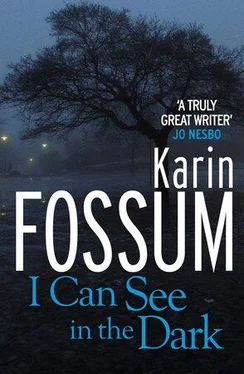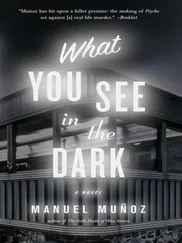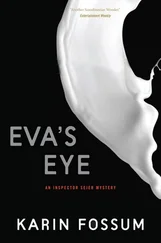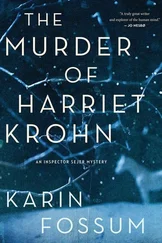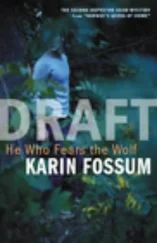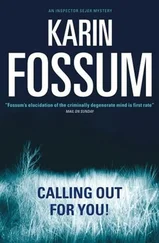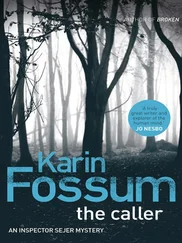I had no answer to that.
Ebba’s news had made me feel faint. As if I didn’t have enough on my plate already, what with the case pending, the wrongful case. My finger found a hole in the chair seat, bored its way in and pulled out a thread which I twiddled with almost frenetic fervour. While I tried to come to terms with the situation. While I did my best to regain control.
‘What about your case?’ Ebba asked. ‘Are you very worried about it?’
I assured her that I wasn’t. I pulled myself together and sat up, my voice was strong and steady.
‘I’m innocent, you know,’ I explained. ‘And there’s something about the truth. It gives one strength.’
I told Margareth about the hidden pattern I believed I’d found in my life, and she listened attentively. She nodded occasionally, and agreed. She also felt part of some larger plan, that her life was inching towards a particular end, an end that had been ordained for her alone.
‘I simply drift along,’ she said, ‘there’s no point in questioning everything. There are so many answers you never get. No, it’s just a case of girding yourself up and doing your duty. All this how and why, and what’s the real meaning behind everything, I’ve given up caring about that.’
Margareth and I were standing in the gleaming prison kitchen, frying enough meatballs to feed twenty. Margareth made the mixture and I moulded the small round balls in my hand and placed them in the browning butter. Immediately there was an angry hissing, and a delightful smell.
‘But that doesn’t mean it’s impossible to get away,’ I heard Margareth say. ‘We can leave the things that are familiar to us and find a new purpose. When we really have to. Start a new life in a different place. Don’t you think so, Riktor?’
She had spoken my name again, and my heart leapt. I stood with a meatball in my hand, the raw mixture was cold and sticky to the touch, and I had to struggle against a sudden urge to throw it across the room, watch it splatter on the opposite wall. And slide slowly down the white tiles towards the floor. These were the kind of whims that would flash through my head. But I kept calm. I was in the process of developing a degree of self-discipline I’d never mastered before. It was because of the routine and the narrow cell, there wasn’t any room to let fly, it was like being firmly contained inside a cylinder.
‘You’re probably right,’ I said, ‘it’s quite possible. But today I was talking to a young man who’s in jail for the eleventh time. He certainly hasn’t managed to get out of the rut. The eleventh time. That only means one thing. He’s lost.’
‘That’s a bit cruel,’ Margareth cut in.
‘No, I’m just being a realist,’ I said.
She wanted to know if I’d met the Russian. She described him as huge and awe-inspiring, completely bald and with a large tattoo on his forehead, which had originally depicted a scorpion, but over the years had stretched a bit at the edges, and now looked more like a great cockroach crawling across his brow. He was in for armed robbery, and he bullied the other prisoners to such an extent that the management was considering putting him in solitary.
‘I’ve met him in the exercise yard,’ I replied. ‘He asked me what I’d done to my teeth. Whether I’d filed them down on purpose, or if they’d just gone like that. So I told him they were the teeth I was born with. That’s the only contact I’ve had with the Russian.’
‘He’s been here before as well,’ said Margareth, ‘a couple of years ago. He’d robbed a jeweller’s shop with three others. Grind a bit more pepper over the meatballs, please. Well, go on man! The boys like them nice and hot.’
I went on and on grinding pepper over the meatballs. By now I’d become very used to these hours spent in Margareth’s company; every day I looked forward to them with pleasure. Margareth, dear Margareth. Those unassuming conversations, the calm and reserve of her personality, her ever downcast eyes. She was certainly no beauty, no Anna Otterlei, but I’d accustomed myself to the mascaraed eyes and the dry, red hair, which she often concealed beneath a frayed scarf. But all the time I was plagued by one great anxiety. I feared the day her assistant might be passed fit to work again. Then, presumably, I’d be banished from the kitchen and left to my own devices, alone in my cell. The mere thought of losing the treasure that I’d at long last discovered was enough to trouble me. And the fear suffused and disturbed me, especially at night. I would sleep fitfully and have nightmares about all that had happened, and that might happen in the future. I’d dream that Arnfinn had risen from his grave, toppled the rhododendron bush, and walked all the way to the prison to denounce me. He’d stand by my bed with a swarm of flies round his head and fat, yellow maggots crawling out of his mouth. I’d never seen such fat maggots. These anxiety attacks could also affect me during the day when I was working in the kitchen. They came from nowhere like bolts of lightning. I’d have to lean on the work surface and breathe calmly for a couple of minutes before continuing work. Margareth said nothing. She worked steadily on, as the smell of meatballs with onions and nutmeg filled the kitchen.
Someone, I don’t know who, had slipped into Nelly Friis’ room. Had stood there staring at her for a few moments. Maybe sat on the chair by the bed, murderous hands in lap, thinking evil thoughts. Then this person had risen, pushed back the chair, pulled the pillow from under her head, grasped it firmly, bent over her and forced it against the thin face with all their strength. Presumably Nelly’s body had gone through some spasms, but she’d probably lost consciousness fairly quickly, debilitated as she was by age and ill health. Then there was silence in Nelly’s room. Only one person was left breathing hard after the crime. They’d replaced the pillow beneath her head and crept out. Perhaps this person was on the staff at Løkka. Or a relation, possibly; relatives came and went as they pleased, and we couldn’t always keep tabs on them. Of all the people who worked at that large institution, the police had singled me out. And I didn’t know why. I always made my moves with the greatest caution, and checked left and right before I entered a room. I pulled hair and pinched and scratched, but no one ever saw me do it. Even so, I’d noticed the atmosphere, the long, resentful looks, as if they knew something anyway. I couldn’t understand it.
My case was scheduled at last.
It was fixed for 10 November. And Margareth’s assistant had been diagnosed with bone cancer. Slowly but surely the cells of the disease were eating away at his bones, and in the end he would collapse like a house of cards. What happy news! I revelled in it like a small child. It secured my place in Margareth’s kitchen. I employed the four remaining weeks in preparing myself thoroughly, and I admitted to Margareth that I’d find it hard to leave her. That soon I’d be alone again in my own little kitchen, with no one to talk to.
‘Well, only if they find you not guilty,’ she said tersely.
I smiled self-confidently. I didn’t believe I would be sentenced for a crime I hadn’t committed, after all, we live in a country under the rule of law.
De Reuter organised some decent clothes for me. Nice grey trousers and a navy-blue blazer, a shirt and tie. I was respectability itself in this costume, although it was actually a size too large. Now I experienced the ticking passage of time in a new way, all those hours and minutes, for at last I had an objective. I was on the way to release. I practised many long speeches I intended to make to the court, delivering them in a firm and steady voice. But de Reuter told me in no uncertain terms that I must obey all the judge’s instructions. I promised to do as he said.
Читать дальше
